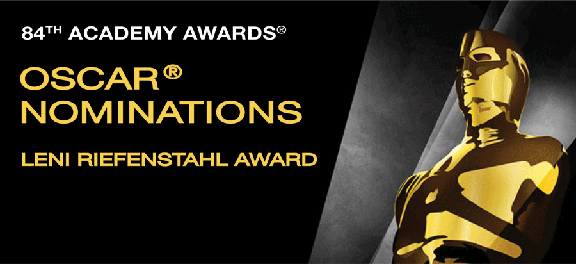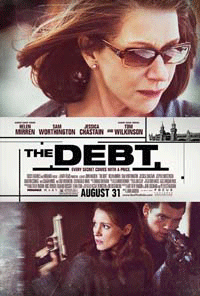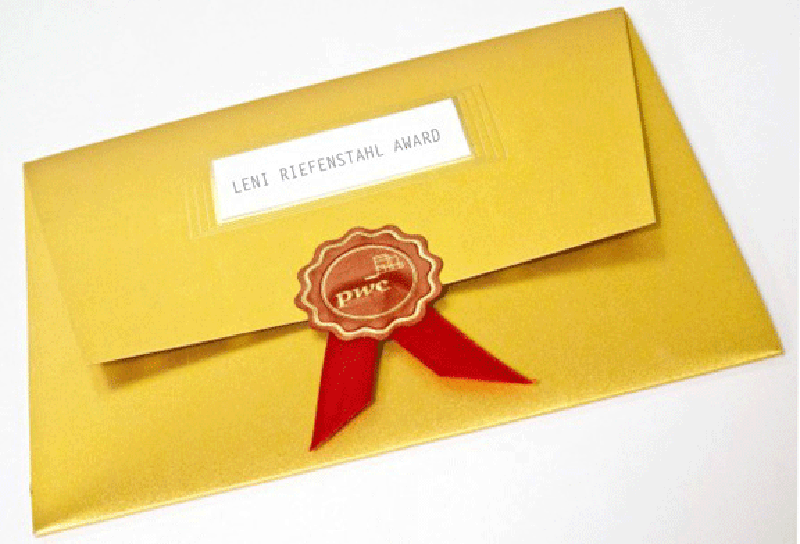

The floor director comes up to the stage: “…and we’re on in 5…4…3…2…" backs away pointing to Boyle. Theme music starts up.)
MIRIAM KALE: “Hi Lance! Got my boots on.”
BOYLE: “Well, let’s get at it, and let’s start with one of your predictions that came true—the list of Best Picture nominees still stands at 10.”
 |
BOYLE: (laughs) “Well, how about starting on a less pessimistic note. Usually we end the show with your pick for The Leni, so this time let’s begin with it.”
 |
KALE: “Great idea! First, for those who don’t know, The Leni Riefenstahl Award is a new Oscar category for Holocaust® propaganda films. This year there a few worthy nominees, but my pick goes to The Debt, an espionage thriller about retired Mossad agents and the (supposedly) botched kidnapping/assassination of a Nazi war criminal.”
BOYLE: “Good choice, but before we get to your analysis, let’s look at two films I had on my list that you didn’t pick: first, Footnote, the serio-comic Israeli film about duelling Talmudic scholars.”
KALE: “I considered it, but decided the subject matter to be too esoteric. Admittedly, the Talmud has numerous passages that are cited to justify Jewish exceptionalism and the violent mistreatment of non-Jews, and this is clearly relevant to what we see today in Occupied Palestine and throughout the Middle East. However, The Leni is not a religious award. Moreover, since all organized religion is fundamentally irrational and can be exploited by militant lunatics to justify atrocities in the name of “god’s will,” nominating Footnote risked conflating Jews with Zionists, and that would itself have been an act of Holocaust® propaganda!”
BOYLE: “Very logical! I hadn’t thought of that. OK, what about In Darkness, the Agnieszka Holland-directed story of Catholic Poles hiding Jews in the sewers of Lviv to keep them safe from Nazis?”
KALE: “I debated a long time over this. The film clearly meets the Leni criteria of promoting the Jew-as-victim stereotype that drives the Israel-has-a-right-to-exist mantra. It also perpetuates our habit of compartmentalizing fascism to the Nazi era. As much as German fascists persecuted Jews, Jewish fascists are today persecuting Arabs. Gaza is recognized as the world's largest ghetto, and the Israeli press is very open about the extreme brutality, even bestiality, of Israeli settlers and soldiers toward Palestinians. The more we regurgitate World War II stereotypes the more easily we give ourselves permission to gloss over this reality.”
BOYLE: “So, why didn’t you select it?”
KALE: “Essentially, because it is based on a true story, and as such has a defensible historical component. It also shows Catholics being compassionate towards Jews, and this counters the argument that Polish Catholics were anti-Jewish. It, therefore, has some value.”
BOYLE: “Now, tell us about The Debt and why you picked it to win The Leni.”
 |
“In 1965, Vogel is bound and gagged and being guarded by our three agents in an East Berlin apartment because the plan to smuggle him out of East Berlin to stand trial in Israel for war crimes falls through. Vogel manages to free himself, slash Rachel’s face and escape. Rachel manages to grab a gun and shoots at him as he flees, but did she kill him or did he get away?”
BOYLE: “Sounds like a typical spy movie, and vaguely similar to Mossad’s kidnapping of Adolf Eichmann from Argentina to stand trial in Israel for war crimes.”
KALE: “It should because it’s based on that event, though this is not a true story. In fact it‘s a remake of an fictional Israeli film of the same name! So this is recycled, Anglicized propaganda!”
BOYLE: “I take it that the Leni nomination comes from the movie’s heroic depiction of Mossad.”
KALE: “In part, yes. This slick film reinforces the perverse myth of the Mossad agent as hero. In reality, Mossad agents are international criminals. They have been behind the assassination of Iranian scientists, the World Trade Centre attack, and even plots to assassinate American politicians, like former senator James Abourezk. This film celebrates Jewish terrorism by making these criminals out to be crusaders for justice.”
BOYLE: “But as a Mengele figure, Vogel is supposed to have conducted medical experiments on people. Can’t a case be made for kidnapping a war criminal to be brought to justice?”
KALE: “We have Interpol and other police agencies to arrest people to stand trial. If you condone Israeli vigilantism, you condone criminal behaviour. But because Vogel was a Nazi, he is placed beyond the moral law, and so it is easy for us to subvert our respect for the law and endorse whatever is done to him and at the same time endorse the Israeli mindset. The irony is that Vogel isn’t really so terrible.”
BOYLE: “What!”
KALE: “Psychological and mental torture, including medical experiments, still goes on today at the Guantánamo Bay Detention Centre. If we condemn Vogel then we have to condemn ourselves.”
BOYLE: “You can’t be serious!”
KALE: “Ever hear of David Hicks? He was the Australian drifter who became one of the first detainees at Gitmo because of the World Trade Centre attack. He was arrested in Afghanistan on a false charge of being a terrorist, and held in seclusion for five and half years. He describes in detail the torture he endured, including medical experimentation, in his book Guantanamo: My Journey, which has been banned in the U.S. and cannot even be sold on-line, despite being published by a large company like Random House Australia. According to Hicks:
‘There were many pills and injections, plus constant blood tests over the years. Everybody regardless of their citizenship should acknowledge that medical experimentation, whether on human beings or animals, is unacceptable. As with animals, we were held as prisoners when these procedures were forced upon us against our will. And as with animals, we were voiceless.’
“In short, ‘Vogel’ is alive and well and working at Gitmo. He isn’t a villain; he’s one of us. If kidnapping or assassinating Vogel is supposed to be morally defensible, why shouldn’t Israelis, Americans, Canadians or other Westerners who are complicit in the Gitmo torture facility also be kidnapped or assassinated?”
 |
“If you condone Israeli vigilantism, you condone criminal behaviour. But because Vogel was a Nazi, he is placed beyond the moral law, and so it is easy for us to subvert our respect for the law and… endorse the Israeli mindest.” Miriam Kale | |
KALE: “This has to do with the film’s title and the transparent lack of justice driving the latter-day agents. Killing Vogel is all about selfishness and ego. In 1997, Rachel’s daughter penned a book extolling her mother’s honour killing of Vogel, but when an old man in a Ukrainian nursing home surfaces claiming to be Vogel and the press gets wind of it, the book is put in jeopardy. If this old man turns out to be Vogel, Rachel must kill him to settle “the debt” she owes for taking credit for a 30-year-old killing that she apparently didn’t do. Essentially, the The Debt is concerned with public relations as a justification for premeditated murder. So much for justice and the great reputation of Mossad!”
BOYLE: “Anything else?”
KALE: “One last point. The film garners inflated credibility from its excellent cast, especially Helen Mirren in the lead role. When an A-list actress like Mirren, and A-list actors like Wilkinson and Worthington lend their collective talent and reputation to such a movie, the propaganda can easily pass for truth.”
BOYLE: “You make a convincing argument, as always. Before we move on to the other categories, there is one prediction you made last year that didn't come true.”
KALE: “Yes. I thought that Bruno Lustig‘s inability to find funding for his film about Jews in Shanghai—of all places—was one sign that Hollywood was finally getting the message that the Holocaust® genre was creatively, morally and politically exhausted. Even the Jewish Telegraph Agency speculated that the Holocaust® movie had been done to death. Alas, there is more pro-Israel propaganda on the way, including a new Steven Spielberg version of Moses, the same Moses that Shlomo Sand said never existed. Where are the scripts about Cast Lead, Mavi Marmara, Qana or some other aspect of our modern Holocaust® featuring an updated fascist villain?”
BOYLE: “Have you forgotten who runs Hollywood?”
KALE: (sighs) “No, I haven’t. As the saying goes: ‘There’s no business like Shoah business,’ so I guess we’ll be talking about The Leni for some time.
BOYLE: “We’ll have to wait to see if the Academy agrees with your choice, but I can’t see how it could disagree.”
|
Click Here To See The Winner
|
 |
BOYLE: “We’ll be back with more of Miriam’s Oscar picks after this commercial message.”
(Theme music and fade out)